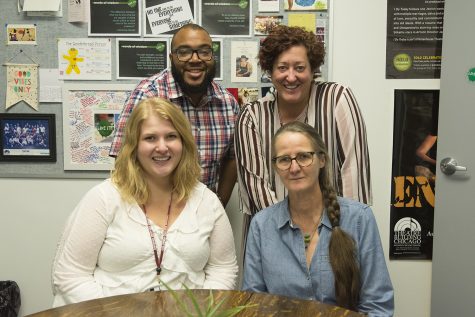Theatre Department shifts toward more diverse and engaging productions
September 2, 2019

(Clockwise from top left) The Theatre Department’s Khalid Long, Carin Silkaitis, Jacqueline Penrod and Noelle Humbert discuss the upcoming season.
After student backlash for a lack of diversity in previous productions, Columbia’s Theatre Department will focus exclusively on “everyday people” who are overlooked by society for its upcoming 2019 season.
Associate Chair and Artistic Director in the Theatre Department Jacqueline Penrod said the new goal for the department is to get as many voices on-stage as possible.
“We want every student to come in here and feel like their voice is valued on our stage and in the classroom,” Penrod said. “It is something we [continue] to work on. We are not perfect.”
The department is focusing on creating an environment that is ever-changing along with society, according to Khalid Long—Diversity, Equity and Inclusion scholar-in-residence and faculty dramaturge.
Earlier this year, students in the production “HOME/LAND” held a meeting to discuss alleged racial insensitivity in casting after white actors were cast in minority roles, as reported April 29 by The Chronicle.
In a May 2 email statement to The Chronicle, then-Interim Chair of the Theatre Department Peter Carpenter said the department was working on curriculum changes to support DEI goals. Shortly after, Carpenter announced he would be leaving the college to take a position as director of theatre and dance at the University of Florida.
The department’s new chair, Carin Silkaitis, said she will work toward the department’s diversity goals. She plans to involve a range of students and faculty by incorporating collaboration in ways that have not been executed before, but did not specifically identify how that will be done. She also plans to respond to related issues quickly and directly, as reported July 1 by The Chronicle.
For the upcoming season, the department will highlight stories of marginalized groups of people with a lineup of productions that discuss race, class, gender and the environment. According to Silkaitis, this season’s show lineup is incredibly rich, both in the stories being told and the people who are telling them.
Penrod said the department as a whole is shifting and rethinking how to go forward. She met with groups of students to see what they want to do and talk about in theatre, and listened to suggestions they had to benefit the department as a whole.
“[The students] are very much involved in not only creating and making theatre, but really creating conversations,” Long said. “Getting them involved in the process can then transfer to skills when they graduate.”
To implement those goals, the department will kick off its season Oct. 17 with “Space,” a play written by theatre alumna Keli Garret. The play brings together two environmental disasters, the 1927 Mississippi Floods and Hurricane Katrina of 2005, to reveal the destruction of a civil society from racial terror and “environmental upheaval.”
Long said “Space,” along with other shows in the upcoming season, “interrogates” people who find themselves on the margins and who are continually oppressed during both global and local traumatic events.
“Because they are already on the margins, these traumatic events put them in even [more] dire situations [compared to] folks that are able to get out of those situations,” Long said. “Often times it is because of issues around identity such as race.”
Amy Gerwert Valdez, junior theatre directing major and former stage manager for “HOME/LAND,” said she thinks it is great the department is focusing on marginalized groups of people, but it is not a strong enough apology for what happened during “HOME/LAND.”
“I wish we could have more, almost like retribution for what happened,” Gerwert Valdez said. “It was very emotional for some people. … With this new focus, I am skeptical.”
Gerwert Valdez hopes for more empathy from—and supports more training for—the faculty, along with hiring more faculty of color, she said.
“For this year, I have high hopes,” Gerwert Valdez said. “I am hoping things will get better [and that] faculty [and] people making these efforts and promises to diversify Columbia, and being more inclusive, will pay off.”
Along with a performance of “Space,” opening weekend will include a workshop and post-show discussion with Garret to further students’ involvement and understanding of the show.
“It is about what the bigger meaning of theatre is and why we are doing it and why all of these hundreds of students are here,” Penrod said. “If we do productions where they are not engaged in the process, then we are doing a disservice.”
With a shift in the department’s production focus, Long said it will introduce a new area of dramaturgy for students to get more involved in working on productions.
Penrod said another goal for the department this year is to open up productions to all students within the Theatre Department.
“[We want to] create more community around our productions,” Silkaitis said.
A way to do so is to have other departments at the college embrace the Theatre Department, Long said. He said the department is not putting on productions purely for entertainment purposes, but also to create an environment where students and faculty members can critically engage.







